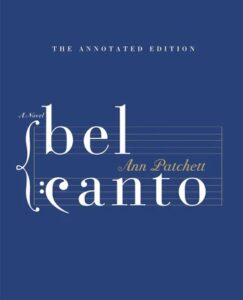
Ann Patchett on Annotating Her Award-Winning Novel Bel Canto Twenty Years Later
“Through annotation, I saw patterns in the book I’d scarcely been aware of...”
If you’ve never read Bel Canto, this is not the place to start. Unmarked copies of this novel abound, and I suggest you get one of those if you want to come to the story without constant interruptions and an introduction that gives the plot away. If, after reading, you’re still interested, please come back. This special edition is for people who loved the book, or liked it well enough, or didn’t like it at all but still have questions. It’s for people who want to study or discuss it. It’s for people who are interested in writing a novel and so would like to see how I put this one together.
The idea for this edition came to me courtesy of an independent bookstore. In late 2023, I was asked to annotate my most recent novel, Tom Lake, as part of an auction that would benefit a small bookstore hit hard by the pandemic. Because the novel was newly published, how I’d written it and the choices I’d made were fresh in my mind. Twelve years of Catholic school had given me good penmanship. I wrote out my notes in the margins of a hardcover copy.
Through annotation, I saw patterns in the book I’d scarcely been aware of, as well as countless small acknowledgments I’d embedded here and there: nods to literature and to friends, and to my life at that moment. I liked doing the work; it helped me clarify the way I write.
Because I’m chronically early, I finished the project months before it was due. As the date approached to turn my copy in, I hesitated to let it go. What if the information could be useful to me in the future? The book would belong to whatever stranger made the highest bid, and I would never see it again. And so I decided to make a copy. Three months after finishing my notes, I took out a fresh Tom Lake and wrote them over again. If you’re wondering why I didn’t enlist the help of a Xerox machine, there are two reasons: first, I wasn’t going to break the spine of a book meant for auction, and second, having the notes handwritten into a book is what made it such a pleasing object in the first place.
Writing and copying are very different endeavors. With writing, I was learning. In the copying, I could see what I had done and what it was worth. Wouldn’t there be readers who would want to see a book taken apart in order to show how it had been put together? I brought the idea to my editor, Jonathan Burnham, and he was interested, but we both agreed that if I were to annotate a book for publication, the book should be Bel Canto.
That’s how I got here.
____________________________
From Bel Canto: Annotated Edition. Used with permission of the publisher, Harper. Copyright © 2024.
Ann Patchett
Ann Patchett is the author of novels, works of nonfiction, and children's books. She has been the recipient of numerous awards including the PEN/Faulkner, the Women's Prize in the U.K., and the Book Sense Book of the Year. Her novel The Dutch House was a finalist for the Pulitzer Prize. Her work has been translated into more than thirty languages. TIME magazine named her one of the 100 Most Influential People in the World. President Biden awarded her the National Humanities Medal in recognition of her contributions to American culture. She lives in Nashville, Tennessee, where she is the owner of Parnassus Books.

























